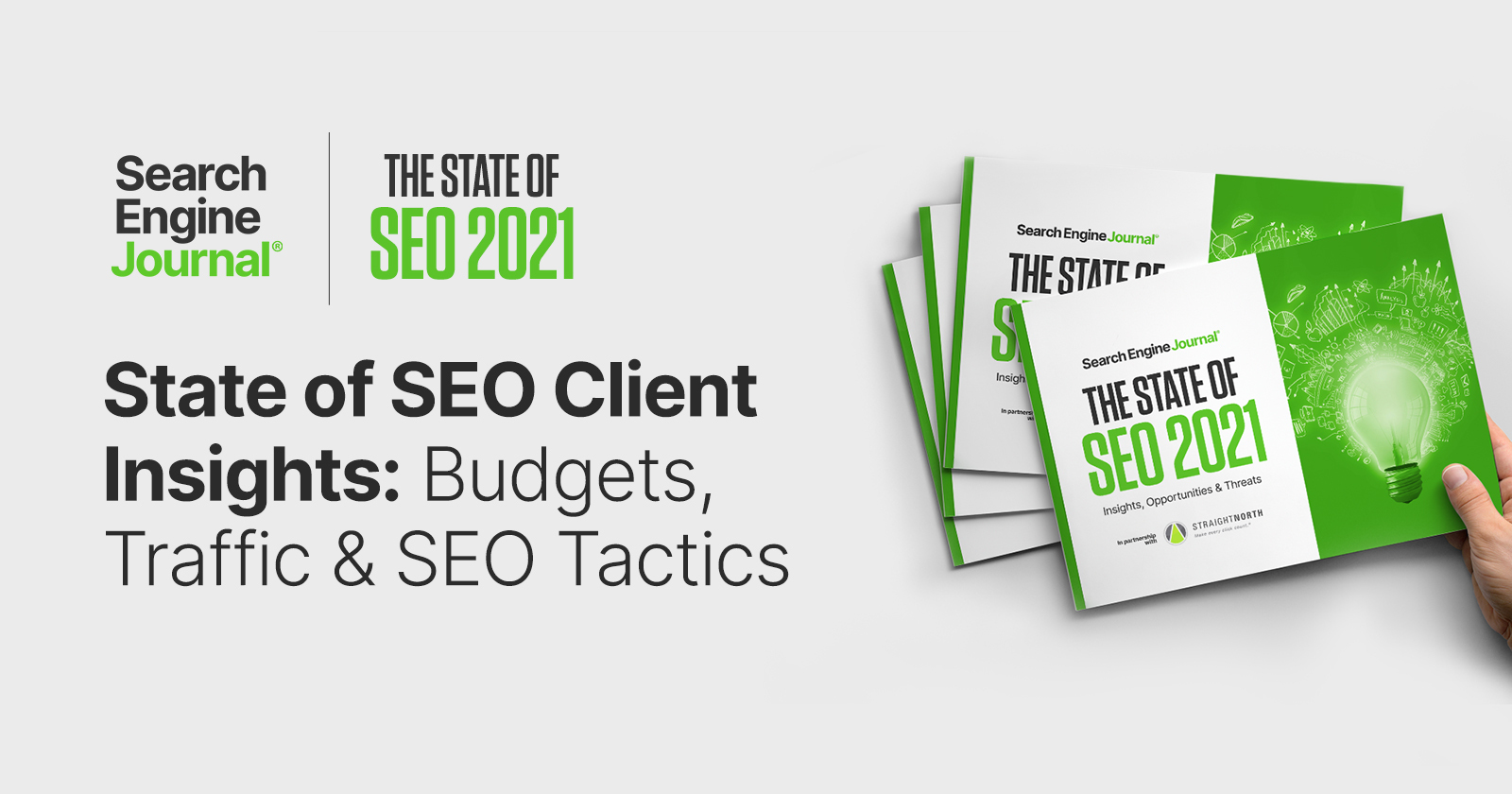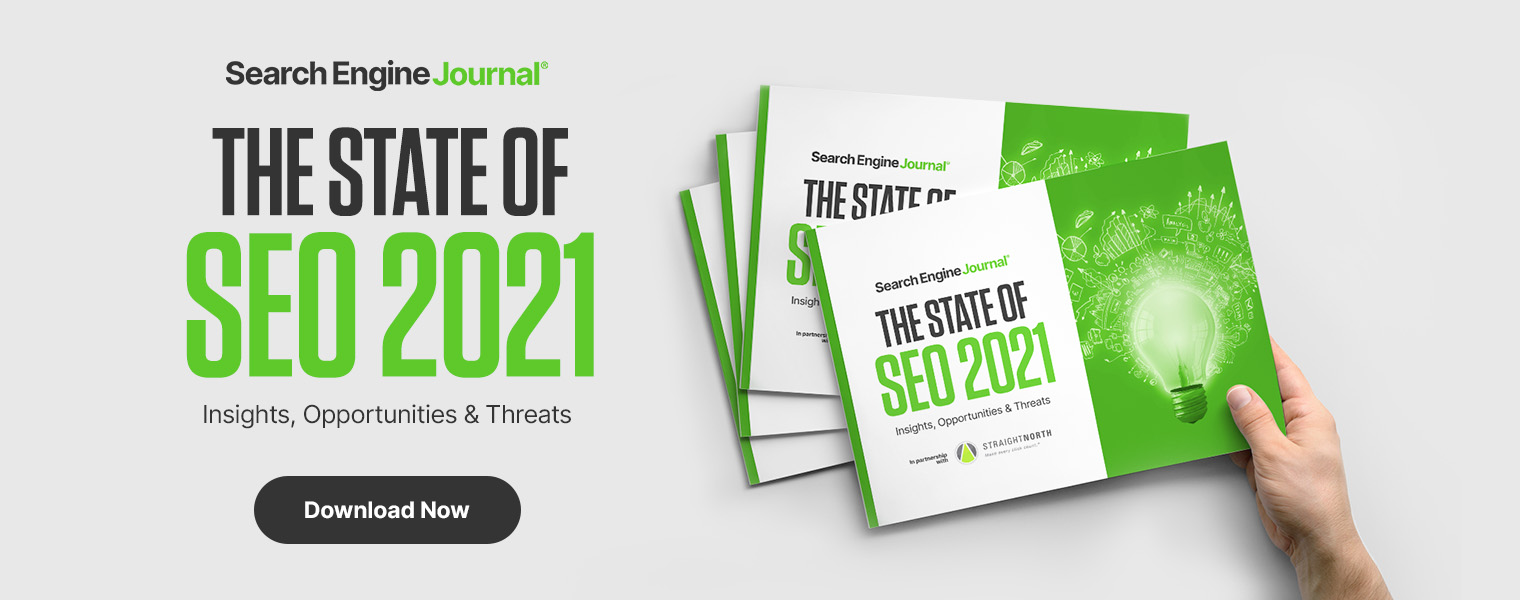Do you know which tasks your competitors are spending time on for their SEO clients?
You probably have some educated guesses, but actually knowing where others are spending their time helps you avoid any missed opportunities.
Also, knowing the budgets that other agencies are charging their SEO clients can be a useful benchmark to know if you should be charging more (or less).
In this second report from Search Engine Journal’s industry survey report, The State of SEO 2021: Insights, Opportunities & Threats, we share insights from 1,241 of the SEO professionals we surveyed, who worked directly with clients through an agency (875) or as a freelancer (366).
In our client-based cohort, 51% worked in B2B, 41% were B2C and 8% fell into a non-specific ‘other’ category.
Keep reading to find out:
- The most common SEO budget range.
- The difference between freelance and agency budgets.
- How SEO practitioners apply their time to tasks.
What is the Most Common Monthly SEO Budget?
Setting a client budget usually consists of indicating the tasks required and breaking down the number of hours required to get results.
Aside from the careful measure of how long a task will take, there is always a degree of guesstimation to cover contingencies and to set your level as an agency.
Getting pricing right is something that is constantly in flux. Being reactive to the market and our competitors is key.
In the State of SEO survey, we learned that the most commonly reported monthly SEO client average budget range is between $1,000-$5,000, according to 27% of respondents.

(Q. What is the average/usual monthly budget paid, per client, for SEO services (USD)? Restricted to those who answered “I work for an agency” or “I’m a freelancer/contractor.” 1,219 answered. 9.5 % selected “prefer not to say.” 0.9% selected “No budget – profit revenue share,” 4.0% selected “no budget – per project,” 0.7% selected “No budget – other.”)
Twice as many agencies (33%) to freelancers (14%) fell into the $1,000-5,000 bracket.
Close behind was a budget of $500-1,000, for 23% of respondents.
Budgets for Agency Compared to Freelance

(Q. What is the average/usual monthly budget paid, per client, for SEO services (USD)? Restricted to those who answered “I work for an agency” (826) or “I’m a freelancer/contractor” (333).)
Comparing the data between freelancers and agencies shows that freelancers tend to charge less than agencies. Freelancer respondents are more likely to charge a budget under $500 than an agency.
Of those charging $500 per month or less, 28% are freelancers.
Surprisingly, a fair number of agencies – 32% – indicated that they charge a monthly budget under $1,000. Clearly, there are plenty of agencies servicing a collection of smaller clients.
It’s worth considering that 14% of our survey respondents were from India and this could explain the lower budgets. Digital workers in India have a 20% share of the global market and have substantially lower costs of living and average earnings.
How Do SEO Pros Apply Their Time to Tasks?
Focusing on where agencies and freelancers spend their time for SEO tasks shows that interestingly, link building has the least amount of time apportioned.
This is most likely due to link building being such a specialist niche that’s difficult to scale and is usually where external support is sourced.
Our State of SEO survey reveals interesting insights into where practitioners spend their time:
- 11.7% of SEO professionals report that the amount of time spent on audience research is “None.”
- 8.67% of SEO pros spend no time at all on mobile SEO, while 7% spend all of their time here.
- Only 7% of respondents spend all of their time on technical SEO.
- 19.2% of SEO pros spend only a little of their total SEO time on on-page optimization.
- 7.3% of SEO pros reportedly spend “all” of their productive time on keyword research.
- Just 5.7% of SEO pros spend no time at all on technical SEO, making it an essential skill for most.

(Q. When working on SEO, how much time do you spend on each of the following activities? Matrix selection, one per row. Restricted to those who answered “I work for an agency” or “I’m a freelancer/contractor.” 1,087 answered.)
If we consider the results in the table above, they do echo the process of SEO and what we would expect:
- Keyword research is a fundamental process to find the right opportunities and to increase traffic.
- On-page factors are an essential contribution to page visibility.
- Analytics are constantly reviewed to measure progress once a strategy is implemented.
- Local SEO is a growing market as more local businesses pivoted online last year.
You might think that technical SEO would feature more highly on the list.
However, technical SEO tends to require a larger investment at the start of a new client relationship and once the initial work is done, takes less time to maintain.
Overall, SEO is a balance between technical optimization and strategy.
SEO can be viewed as divided into two parts, according to Eric Enge of Pilot Holding:
“Getting technical SEO right. In absence of doing this, you have no chance of success. But ultimately, this is somewhat like buying a ticket to enter a competition. If you don’t buy the ticket, you can’t win,” he said.
Enge added that the second part is, “Executing the right SEO strategy. This is how/where you map out all of the plans for pages and content with a goal of offering a site superior to that of your competition. Once you have entered the competition (gotten the tech SEO right) this is how you win.”
How Have Budgets Changed in the Last 12 Months?
The State of SEO survey reveals that 50.5% of client budgets increased either a little or a lot over the last 12 months, while just 3.8% of budgets were cut completely.
Close to sixteen percent of clients reduced their SEO budget to some degree, and 23.8% held the course by maintaining the same budget over the past year.

(Q. In the last 12 months, how has your client’s budget for SEO changed from the year before? Restricted to those who answered “I work for an agency” or “I’m a freelancer/contractor.” 1,219 answered. 6.1% selected “Don’t know.”)
Last year, when the pandemic started, there was an initial panic of work being put on hold and budgets being cut. Then came the real uncertainty.
Following that initial panic, it became apparent that the digital infrastructure was vital and online marketing work switched back on. Work then began to quickly flow again and demand increased.
From our survey, results showed that budgets increased a little, or stayed the same.
Based on the importance of digital marketing for business survival post-pandemic, it’s likely that more budget will be allocated to SEO as we move forward.
That means there will also be greater demand for highly-skilled SEO pros to manage the increase in competition.
Jason Barnard of Kalicube explains: “Initially I had clients cancel contracts or cut back drastically – an understandable knee-jerk reaction given that nobody had any real idea what was happening or how the situation might pan out.
“Once the shift-to-online became apparent after a couple of months, the budgets went back up and clients started approaching me for help adapting to the ‘new normal’.”
How Did Traffic Change for Clients in the Last Year?
The overall trend last year was an increase in traffic as more people were at home and the internet became their portal for the outside world. Everything happened online.
Worldwide, internet traffic levels increased by 40% and most SEO pros experienced a boost in traffic for clients as a bonus of the rising tide.
According to our survey respondents, most SEO clients (41%) experienced a little increase in traffic, while 23% saw their traffic increase a lot; overall, client website traffic increased for 64.2% of respondents.
Only 5% of SEO professionals saw traffic decrease a lot for their clients.

(Q. In the last 12 months, did you experience any change in rankings or traffic for clients? Restricted to those who answered “I work for an agency” or “I’m a freelancer/contractor.” 1,219 answered. 4.1% selected “Don’t know.”)
If we compare the level of budget to the level of traffic, we start to see the impact that investment of time into SEO has on the results that can be gained:

(Q. In the last 12 months, how has your client’s budget for SEO changed from the year before? Compared to: Q. In the last 12 months, did you experience any change in rankings or traffic for clients? Restricted to those who answered “I work for an agency” or “I’m a freelancer/contractor.” 1,219 answered. )
The data shows a clear correlation between traffic and budget increase/decrease:
- Where budgets increased a little, 54% of those saw a little increase in traffic.
- Where budgets increased a lot, 59% of those saw traffic increase a lot.
- On the reverse, for a budget reduced by a lot, 20% of those saw traffic decrease a lot.
It’s not a myth that many clients believe once they have invested in SEO as a “one-off,” they can then ride from the results for a long time. Job done.
Andrew Shotland of Local SEO Guide shared, “Unfortunately, yes — budgets do correlate with changes in traffic levels and success. It’s a bit self-serving to say, of course, but the clients that tend to do best are those that continually invest in SEO and double-down on winning strategies.”
To a degree, really solid technical SEO work can have a benefit for some time.
But the constant changes Google makes to the algorithm, link decay, and rising competition will gradually erode rankings and traffic over time.
“On sites where the technical SEO is already sound and budgets are being invested in adding content/making content improvements across the site we see a very strong correlation between increased budgets and increasing traffic,” Eric Enge said.
He added, “Done the right way this is like printing money. In other types of investments, the results are not as predictable but generally still have a positive effect.”
Learn more about what matters now in SEO and where to focus next in this report sharing emerging trends and ranking factors from the State of SEO 2021 survey.
More Resources:
- 7 Things I Learned Running SEO at a Digital Marketing Agency
- 8 Ways to Become a Great SEO Consultant
- Your Guide to Google E-A-T & SEO
You might also be interested in reading our SEO Salary Report 2021. Discover the average SEO salaries by job title and years of experience in survey findings from 2,300+ respondents.
All data for this article was taken from the Search Engine Journal State of SEO Survey 2021.
Find insights such as:
- What are the most important emergent factors for the next few years?
- What Google changes are considered the biggest threats to SEO?
- Which factors have the most impact on ranking.
- Where to find new business.
- What to focus on for the next year.
Featured image: Paulo Bobita/Search Engine Journal
All in-article images created by author, August 2021






